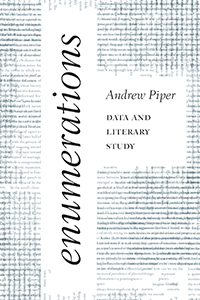
Enumerations : Data and Litterary Study
Andrew Piper
University of Chicago Press
256 p.
ISBN: 9780226568751
27,50 $
PRESENTATION
For well over a century, academic disciplines have studied human behavior using quantitative information. Until recently, however, the humanities have remained largely immune to the use of data—or vigorously resisted it. Thanks to new developments in computer science and natural language processing, literary scholars have embraced the quantitative study of literary works and have helped make Digital Humanities a rapidly growing field. But these developments raise a fundamental, and as yet unanswered question: what is the meaning of literary quantity?
In Enumerations, Andrew Piper answers that question across a variety of domains fundamental to the study of literature. He focuses on the elementary particles of literature, from the role of punctuation in poetry, the matter of plot in novels, the study of topoi, and the behavior of characters, to the nature of fictional language and the shape of a poet’s career. How does quantity affect our understanding of these categories? What happens when we look at 3,388,230 punctuation marks, 1.4 billion words, or 650,000 fictional characters? Does this change how we think about poetry, the novel, fictionality, character, the commonplace, or the writer’s career? In the course of answering such questions, Piper introduces readers to the analytical building blocks of computational text analysis and brings them to bear on fundamental concerns of literary scholarship. This book will be essential reading for anyone interested in Digital Humanities and the future of literary study.
TABLE OF CONTENTS
Preface
Introduction (Reading’s Refrain)
1. Punctuation (Opposition)
2. Plot (Lack)
3. Topoi (Dispersion)
4. Fictionality (Sense)
5. Characterization (Constraint)
6. Corpus (Vulnerability)
Conclusion (Implications)
Acknowledgments
Appendix
Data Sets
Notes
Index
REVIEWS
"This is the book that literary studies needs. To read Enumerations is to follow the movement of a mind lit up by the new interpretive pathways that computational reading opens, and thus to see demonstrated before one’s eyes its enormous significance. From massive questions like 'What is fiction?' to miniscule matters like 'What details allow us to see two poems as similar?,' Piper uses computational modeling to defamiliarize the act of literary interpretation. One puts down Enumerations with a sense of how rich a field literary studies is, of how many questions we still have to ask, of how much work we have to do. In language that is theoretically sophisticated and technically straightforward—that leaps gracefully from Barthes’s 'non-sentence' to the concept of distributional semantics—Piper finally answers literary scholars’ persistent 'So what?'"
Adam Hammond, University of Toronto